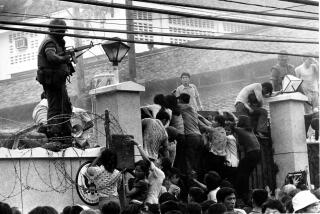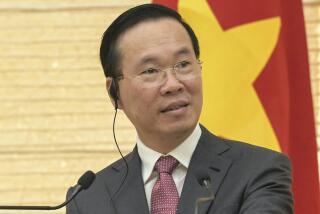Lift Embargo but Not in Bits and Pieces : Our half-measures on Vietnam are hurting U.S. business and the Vietnamese people.
Thanks to all the tinkering, the Administration’s embargo on trade with Vietnam is looking less and less like a hard line and more and more like a sieve. The President would do well to dispose of it completely. It makes a mockery of the political ideals it is supposed to uphold, feeds corruption in Vietnam, needlessly punishes American business and hurts the poor families of Vietnamese refugees more than it hurts the communist regime in Hanoi.
On Sept. 13, President Clinton partly lifted the embargo. Companies that have Vietnam-related contracts with the World Bank or with other international financial institutions are now allowed to set up shop there. All others are still locked out.
In theory, this half-measure is supposed to please both those who want to continue using the embargo to press for a full account of the whereabouts of American POW-MIAs in Vietnam as well as those who want to do business in that country. But in practice it pleases almost no one--except perhaps the lawyers and bureaucrats who will take months to interpret the new rules for the embargo.
It is unclear which American companies will benefit from the changes. Companies in construction may get a boost. But oil and gas companies remain locked out of a sector that is attracting almost half of the foreign investment in Vietnam. The longer American companies are shut out, the harder it will be for them to establish a foothold in the crowded market.
The Administration gives the appearance of having made a small concession to the regime in Hanoi by loosening restrictions only on the modest amount of business conducted through institutions like the World Bank. But the World Bank works exclusively with the Vietnamese ruling party. Thus, it will transfer aid money and expertise directly to the rogue that has angered so many Americans. It favors the old guard over more reformist elements of Vietnamese society. If the whole embargo were lifted, American companies could go into Vietnam and create jobs and make money while cooperating only as needed with Hanoi.
The embargo helps Vietnam’s elites in other ways. The transfer of dollars to Vietnam from Vietnamese-American merchants and other refugees--$100 million goes through U.S. banks annually and more is brought in by smugglers--creates inflation. Rising prices rob the poor and help the wealthier, often corrupt elements of society through whom dollars are exchanged and goods are distributed.
If the country’s treasury had a better understanding of the flow of money into the $15-billion Vietnamese economy, it could control the destabilizing effects. This could be achieved by lifting the embargo.
The stopped-up flow of trade and dollars also builds unhealthy pressure in the Vietnamese-American economy in Southern California. Some business leaders in the community say that Little Saigon’s anxious merchants are leaning so far over the starting gate that lifting the embargo promises to leave parts of Orange County in the dust: When the gate opens, they’re rushing out.
At one time, the Vietnamese-American community supported the embargo. But now, family ties are pulling people and their sympathies back there. Last year, 40,000 visas were issued by the Vietnamese Embassy in Mexico City, mostly to Vietnamese in the United States. This year’s total already exceeds 38,300. The actions of Vietnamese-Americans say they are ready for a change. That leaves a very small constituency in favor of the embargo.
The Bush Administration poked a hole in the embargo in April, 1992, by granting AT&T; permission to set up telecommunications in Vietnam. With that, Washington lost the leverage of a principled stand against that country. The threadbare embargo no longer demonstrates American strength of will.
Furthermore, it channels too much energy into exorcising one ghost--the MIA and the memory of war--and leaves aside other concerns. If U.S. policy-makers continue to hold contempt for a Cold War regime whose new constitution guarantees exclusive power for the communists and calls their party “the force leading society,” they have better ways of conveying that view. Lifting the embargo gingerly looks like peekaboo, not policy.
Trade and political contact will encourage economic growth and political reform in Vietnam. This can pry Vietnam’s ruling party out of the realm of private commerce and private life. It can lead Vietnam to want a stake in regional stability, to build good relations with its capitalist and democratizing neighbors, and to grow out of its Cold War mentality. But first, the United States must lift the embargo in one fell swoop.
More to Read
Get the L.A. Times Politics newsletter
Deeply reported insights into legislation, politics and policy from Sacramento, Washington and beyond. In your inbox three times per week.
You may occasionally receive promotional content from the Los Angeles Times.










